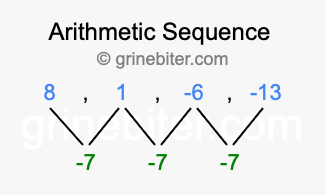
Here we answer many questions about the sequence 8, 1, -6, -13... What type of sequence is 8, 1, -6, -13? What is the next number in the sequence 8, 1, -6, -13? What is the nth number in the sequence 8, 1, -6, -13? What is the sum of the first 20 terms in the sequence 8, 1, -6, -13? What is the sum of the first n numbers in the sequence 8, 1, -6, -13?
In addition, we will also give you the formula that is used to calculate the next number or the nth number in 8, 1, -6, -13, and the formula to calculate the sum of n numbers in 8, 1, -6, -13.
A sequence is a list of numbers in a pattern, and each number in the sequence is called a term. We will use "terms" and "numbers" interchangeably on this page.
So, what type of sequence is 8, 1, -6, -13? The sequence 8, 1, -6, -13 has a common difference of -7 between each term. We call this kind of sequence an arithmetic sequence. Below is an image illustrating the correlation between the arithmetic sequence 8, 1, -6, -13 and its common difference of -7.

Now, what is the next number in the sequence 8, 1, -6, -13? Below is the formula used to calculate the next number in an arithmetic sequence, such as 8, 1, -6, -13. The first term listed in the sequence is "a", the common difference is "d", and "n" is the nth term of the arithmetic sequence.
a + (n-1) × d = Next Term
As stated above, the common difference (d) between each term is -7. Furthermore, the next term in 8, 1, -6, -13 is the fifth term (5), and the first term is 8. When we enter these values into our formula, we get the following answer:
8 + (5 - 1) × -7 = -20
Thus, the next number (term) in the sequence 8, 1, -6, -13 is -20. The tool below calculates the nth term of the sequence using the formula above. For example, type in 20 if you want the 20th term in the sequence 8, 1, -6, -13, or 100 if you want the 100th term in the sequence 8, 1, -6, -13.
Let's move on to our next question. What is the sum of the first 20 terms in the sequence 8, 1, -6, -13? We use the formula below to calculate the sum of the first n terms in an arithmetic sequence such as 8, 1, -6, -13. Again, note that the first term is "a", the common difference is "d", and "n" is the nth term of the arithmetic sequence.
(n/2)((2 × a) + (n - 1) × d) = Sum
When we enter the a, d, and n values into our formula, where n is equal to 20, we can calculate the sum of all numbers up through the 20th term in the sequence 8, 1, -6, -13, as seen below:
(20/2)((2 × 8) + (20 - 1) × -7) = -1170
Therefore, the sum of all numbers up through the 20th term in the sequence 8, 1, -6, -13 is -1170. Below is another tool we created to make these calculations easier for you. This tool can calculate the sum of any number of terms in the sequence 8, 1, -6, -13 using the formula mentioned above. For example, if you type in 50, then it will calculate the sum of the first 50 terms in the sequence 8, 1, -6, -13.
Arithmetic Sequence Calculator
Go here to learn more about arithmetic sequences using the best online Arithmetic Sequence Calculator.
Sequence 9, 2, -5, -12
Here is the next sequence in our database that we have researched, defined, and explained for you.
Copyright | Privacy Policy | Disclaimer | Contact
